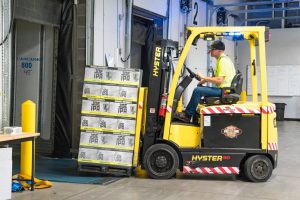 When companies run logistics, they expect this to become a vast convenience for their brand – not a hindrance. It’s true, however, that this is a complex operation to set up and benefit from. It’s also true that many elements of a supply chain can struggle to function, deteriorate over time, or even fail to operate well in the first place.
When companies run logistics, they expect this to become a vast convenience for their brand – not a hindrance. It’s true, however, that this is a complex operation to set up and benefit from. It’s also true that many elements of a supply chain can struggle to function, deteriorate over time, or even fail to operate well in the first place.
So – how can you ensure your logistics are more reliable? What errors should we look for? How might we apply permanent solutions to temporary, yet recurring problems? Furthermore, how can we customize a worthwhile approach for your business, rather than simply copying and pasting an approach that worked elsewhere? These are important questions, and not only that, they’re quite interesting, too.
For anyone with a systems-driven mindset, focusing on logistics can feel enjoyable. It’s great to know how things can work, and how you’ll find increased optimization for your supply chain network. Furthermore, this is a fantastic milestone for any business to consider. So – let’s consider it, together:
Regular Staffing
Regular staffing can make the world of difference in a work setting where high employee turnover is almost a guarantee. By the nature of the work many truck drivers are hired from external sources, or find themselves accepting different work contracts around the country depending on where they travel to. If you’re looking for temporary truck drivers, it’s always best to align yourself with a service that can provide fully vetted, licensed individuals, such as through the resource we have linked. This allows you to ensure your logistics nodes will always have a professional to work them, helping the framework operate more smoothly.
Hire A Fleet Manager

Logistics is a full-time job. It takes time, energy and enthusiasm to track all of the moving parts, and more than that, authority is essential when those vital decisions need to be made. This means that hiring a fleet manager to work on this full-time is essential. If you can, grant them an assistant. This will help your fleet remain cared for, and issues will be reported to you ahead of time. Fleet managers will usually have dedicated experience within a logistics framework, and this can help lubricate the proverbial wheels of your machine greatly.
Fueling Stations
Fueling stations are the name of the game when it comes to logistical planning. It can be that using fuel cards to grant your truckers more room to maneuver, or setting up recyclable carry containers at each of your distribution centers can help you keep your consumption of these fuel sources as clean as possible will help you improve your approach going forward. Fueling stations can also take into account the maintenance of your trucks and spot errors in advance, helping you avoid costly repairs with preventative measures. Managing the movement of your logistics measures is just as important as fitting them for service in the first place, and so we don’t blame you for making this a priority.
With this advice, we hope you can more easily ensure your logistics are reliable, and serve you until the end.